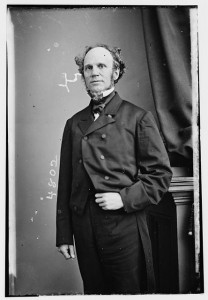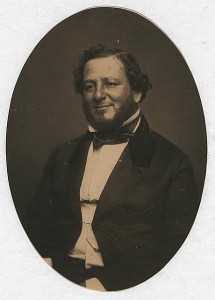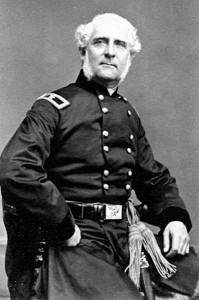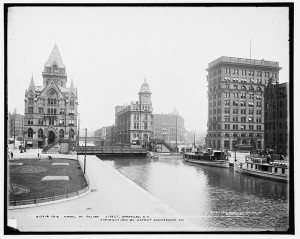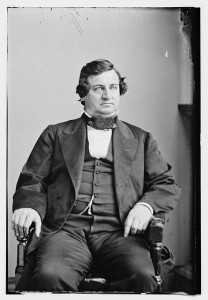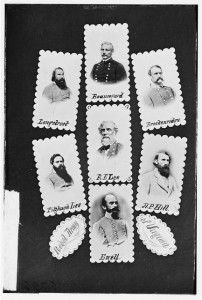Democrat Horatio Seymour opposed Republican James S. Wadsworth in the 1862 race for New York governor. 150 years ago this week the Republican-leaning New-York Times published an editorial about a month from Election Day. There are three classes of Seymour supporters – rebel sympathizers, Democrats who prefer party over the nation, and those dissatisfied with the Lincoln administration. The editorial concludes by showing the fallacy of the anti-administration class and then says that a vote for Seymour is a vote to aid and abet the rebels.
From The New-York Times October 5, 1862:
What the Opposition is Composed of. …
Now, these men [those upset with Lincoln’s administration], assuming them to be loyal In heart, show a most extraordinary want of logic in the conclusion to vote for SEYMOUR, which they draw from their premises. Granted that the Administration has erred, has been too Pro-Slavery, or too Anti-Slavery, has been too energetic or not enough so, the conclusion to vote for SEYMOUR is a non sequitur. It is as if a man, because doctors are guilty of malpractice sometimes, should help a vessel with the yellow fever on board to run the Quarantine. It is as if burglars should break into our house, and one of the inmates, being dissatisfied with the actions of the Police, should join with the thieves and trip up the officers’ heels.
Now, all these three classes of men are excessively indignant at being told that they are aiding and abetting the rebels. But this is the fact, and it is no answer for them to say that they have given their money and sent their sons to the war. ARNOLD gave his money and his blood for the country, but none the less did he help the enemy when he offered to give up West Point. And so the men who seek the election of SEYMOUR, whether they mean it or not, are helping the rebels, no matter what they have done before to hurt them. We wish that every one who proposes to vote for SEYMOUR would ask himself the question, What would JEFF. DAVIS advise me to do, if I were to ask him? Which vote would do most to please FLOYD and BENJAMIN, and TOOMBS and WISE, and LETCHER and the whole gang of thieving, perjured rebels, who have brought the country to this pass? Which vote would win for me the approbation of the I Richmond newspapers? Which vote would gratify most and encourage most the rebel Generals? No honest man can answer these questions in any way but one. A vote for SEYMOUR will insure to any one the applause of the whole rebel crew. It is enough for us, and it seems to us that it must be enough for any man who loves his country, to know that this is so to insure our supporting WADSWORTH with all our energies. Show us what the rebels would have us do. We want nothing else to send us in the opposite direction.
__________________________________
Here’s an earlier Times editorial on the race. The Republican convention was held in Syracuse on September 24th. General Wadsworth was nominated, although John Adams Dix was also considered, even after receiving votes at the Constitutional Union party’s convention on September 9th. This piece points out that the Syracuse convention enthusiastically supported President Lincoln’s September 22nd Emancipation Proclamation.
From The New-York Times September 26, 1862:
The State Canvass.
The State canvas is fairly opened, and according to all appearances it bids fair to be one of the most hotly contested which we have ever known. The spirit and temper of the Syracuse Convention indicated a purpose, on the part of the War Unionists of all political parties, who were there represented, to join issue directly with the peace and submission Democrats, and to give them as sharp a fight as they may desire.
Gen. WADSWORTH, their candidate for Governor, is a thoroughly representative man, -devoted heart, soul, and fortune to the crushing of the rebellion, and not disposed to make terms of any sort with traitors in arms. Unlike Gov. SEYMOUR, he has nothing but blows for rebels, and gives the Government of his country a hearty and unqualified support. He is widely known as an able, generous, liberal man, perfectly independent in feeling as in fortune, and deserving the universal confidence and esteem which he enjoys. LYMAN TREMAIN, the candidate for Lieutenant-Governor, is fresh from the ranks of the Democratic Party, a lawyer of ability, and a man of commanding influence and popularity through a very large section of the State.
The Convention was large, able, perfectly harmonious, and intensely enthusiastic in support of the Government, and especially in approval of the President’s proclamation emancipating the slaves of obdurate rebels. A portion of the delegates deemed it expedient to nominate Gen. DIX, in order to give the loyal Democrats an opportunity to stand by the Government without forfeiting their party preferences. With this exception, there was not the slightest difference of opinion as to principles or policy in the Convention, — and when a very large majority of the delegates overruled this suggestion, nothing was left but the most complete and unanimous enthusiasm in support of the ticket and the cause.
The canvass opens in a manner to give assurance that we shall crush out treason at home as effectually as we hope to crush the more open and manly rebellion beyond our borders.

